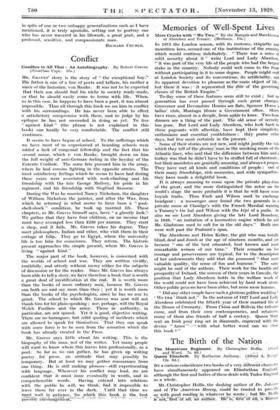Memories of Well-Spent Lives
More Cracks with " We Twa." By the Marquis and Marchioneag of Aberdeen and Temair. (Methuen. 15s.) solid security about it " write Lord '.and Lady Aberdeen,
. .
" it was part of the very life of the people who had the largest stake in the country. -Nobody -could well come to the front . without participating in it to some degree. People might Ron rat London 'Society 'and its -conventions, its artificiality, and its apparent devotion to pleasure as the main object of life ; but there it was : • it represented the-elite of the governing
• disses of the British Empire?' - • - "-
To-day some of these features seem still to exist ; but no generation has ever passed through such great changes, Grosvenor and Devonshire Ilmises- are flats, Spencer House a ladies' club, Montagu House a Government office. Skirts have risen; almost in a deeade,.froin ankle to knee. Two-hour dinners are a thing of the, past: The old sense of security has gone.. But Lord and LadY.-Abeideen, 'who look back to these: pageants, with affection,"; have kept their simplicity, enthusiasm' and essential youthfulness : they praise other 'days, but live most certainly in the • present. 7 Some of their stories' are not new, and might justify the tale whieh'they tell-of the gloomy man in the smoking room of the Atlantic liner, win; said that the differeilee between him and a turkey was that he didn'fhaire to be stuffed full of chestnuts; buttheir anecdotes: are generally imuaing,-and always a propos. They have met all kinds and conditions of people : out of their many friendships, rich memories, and wide sympathies, they have made a delightful book.
It is always amusing to come upon the private play-time of the great, and the more distinguished the actor on the world's stage the more probable it is that he will have some boyish traits. Thus Foch and Wilson used. to exchange headgear : a messenger once found the two generals in a private room at Claridge's with the French Marshal wearing a Tommy's tin hat and Wilson with the kepi of a palls. So also we see Lord Aberdeen giving the late Lord Rosebery, in 1928, " an imitation of a locomotive engine which he and Mr. Gladstone used to call for in the old days." Both men were well past the Psalmist's span.
The Aberdeens met Helen Keller, the girl who was totally blind, deaf and dumb at the age of nineteen months, and yet became " one of the best educated, best known and most remarkable women of our time." Their remarks on her courage and perseverance are typical, for to the description of her endowments they add that she possessed " that most valuable quality, the sense of fun and humour." The same might be said of the authors. Their work for the health and prosperity of Ireland, the-success of their years in Canada, the position that Lady Aberdeen holds in the welfare work of the world could not have been achieved by hard work alone. Other public persans-have been abler, but none more human.
" Did any other couple have such a glorioni golden wedding ? ' We twa ' think not." In the autumn of 1927 Lord and Lady Aberdeen celebrated the fiftieth year of their married life at the House of Cromarty. From China and Bolivia the tributes came, and from their own contemporaries, and retainers, many of them also friends of half a century. Queen Mary sent an Irish posy ring set in diamonds, engraved with the device " Amor "—" with what better word can we close this book ? " IN 1875 the London season, with its customs, etiquette and unwritten laws, seemed one of the institutions of the country which would continue indefinitely. " There was a sense of






























































 Previous page
Previous page